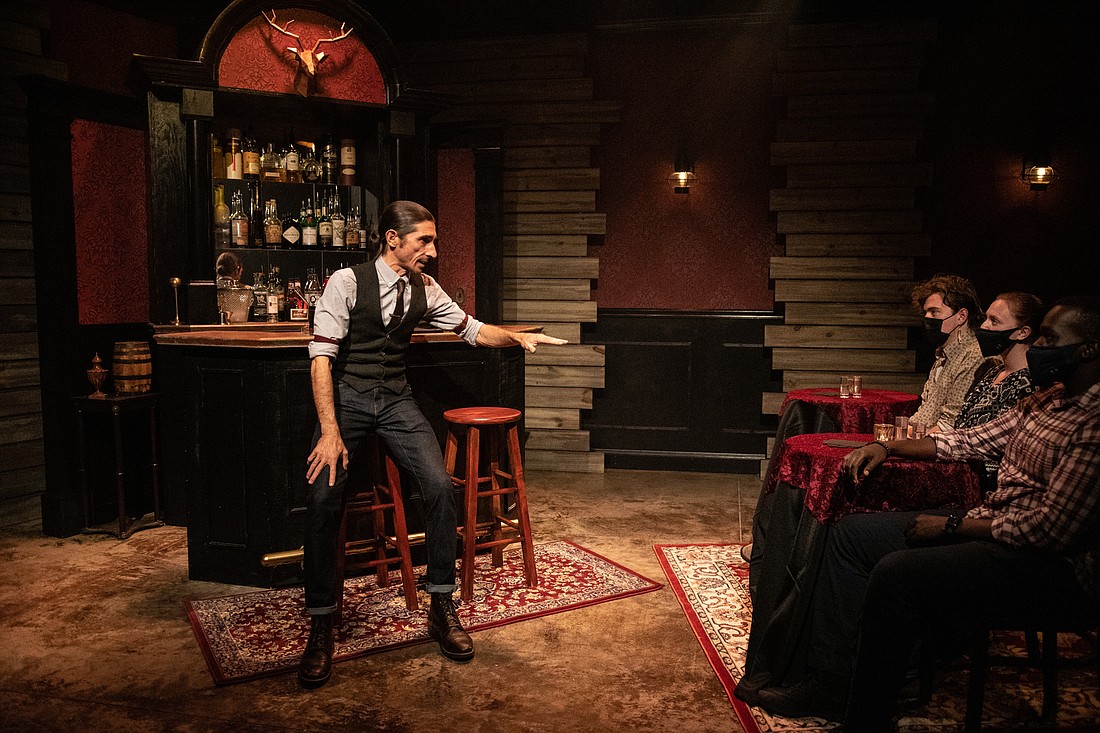- July 26, 2024
-
-
Loading

Loading

Ronán Noone’s “The Smuggler” is now stealing hearts, minds and everything that’s not nailed down at Urbanite Theatre.
The one-man play flows from a cheeky, funny, literate script.
Is the playwright showing off? You’d better believe it. Noone set the play on Amity Island — the setting of “Jaws.”
The playwright also had the gall to name his protagonist Tim Finnegan, the hero of an Irish drinking song and James Joyce’s “Finnegans Wake.” But his literary ambitions don’t end there. Finnegan’s story unfolds in rhyming couplets. And they’re good, too.
That description might sound like lofty, intellectual, post-modern hoo-hah. No worries. The actual play is entertaining as hell.
Like his creator, Tim Finnegan (Giles Davies) is a born storyteller. Charming, too.
Finnegan charms the audience with a tale encompassing a vengeful mayor, a car crash tragedy, a dysfunctional family and a rodent of unusual size. But his story is mostly about undocumented immigrants and the bad people who make a good living by smuggling them.
People like Mr. Finnegan. Eventually.
He doesn’t seem the type, at first. This barkeep is an affable fellow — and he has a way with words. You discover that, once upon a time, Finnegan dreamed of being a big-name author and had cracked the pages of Paris Review, The Irish Times and other prestige publications. But that didn’t pay the bills. He wound up as a bartender on Amity Island — and used up his storytelling powers amusing the drinkers. When the bar went out of business, Finnegan couldn’t pay the bills at all.
He winds up living in a glorified shack with his young wife and son. The subject of bringing home the bacon comes up. Sexist or not, Finnegan’s the man of the household and expected to provide. This is America, the land of opportunity. And if you’re living like a bum, it’s your fault. This subject comes up, too. Repeatedly.
Finnegan makes up his mind to pull himself up by his bootstraps. Since he doesn’t own any boots, he decides that stealing is his next best option. From whom?
Immigrants, of course.
Amity Island is packed with undocumented immigrants, who make up the bulk of the workforce.
They’re bakers, carpenters, dishwashers, hotel laundry workers, house cleaners, landscapers, painters and plasterers.
They take the jobs most American citizens don’t want. And they do get paid. They can’t deposit their hard-earned money in a bank, so where do they put it? Mattresses, walls and hidey-holes, natch.
You’d think his train of thought would stop right there. Stealing the blood money of immigrants striving for a better life sounds low. Finnegan’s an immigrant too; you’d think he’d sympathize. Ah, but he’s a legal immigrant — and a citizen now. These are undocumented. That’s different.
Finnegan’s hell-bound train of thought continues.
He reasons that the island’s immigrants pack themselves into run-down houses and leave for work bright and early. Once the house is empty, the cash inside is easy pickings. His reasoning is sound. Aside from a nasty rat bite, his first heist goes smoothly.
From there, it’s an easy step to the next snatch-and-grab. And just a few steps more to other crimes. Immigrant smuggling, for one. And crimes far worse than that.
Each step begins with a rationalization. Finnegan is breaking the law for his family and his dignity! It’s the American way. He has no other choice. You’d do the same for your family, wouldn’t you?
A path to the dark side, this is. But the journey is a comic romp — until you figure out where Finnegan’s taking you.
Dee Sullivan outfits him with the vest, tie and rakish hat of the classic card sharp or racing tout. It’s deliberately anachronistic and ideal for the play’s temporal indeterminacy. Aside from a few cellphone references, this could be the 1940s. Or the 2040s. Frank Chavez’s set looks like an actual/factual working bar. (When Finnegan starts mixing drinks, you realize it is.)
Lighting designers Simean Carpenter and Alex Pinchin mix the mood in keeping with Finnegan’s story. Sean Ragan’s sound design intersperses the story with car crashes, baby cries and the like. Noone’s play is a one-person monologue, after all. It’s a lot like a radio play, unfolding in the theater of your mind. The sound design makes it work.
Director Brendan Ragan reveals Finnegan’s dark path with subtle realism.
This is art imitating art imitating life, after all. But it all seems believable, thanks to Ragan’s direction. He also has a great ear for the music of Noone’s seductive wordplay. As does the solitary actor.
Davies is an excellent performer. He embodies the role of Tim Finnegan, the charismatic raconteur. Big smile, quick wit.
His character starts the play behind the bar, mixing drinks for a few lucky theatergoers. Davies then proceeds to tell Finnegan’s tale. He winks, clowns around, interacts with the audience. You drop your guard. Great characterization! But this one-person show has more than one character. Along with Finnegan, there are 10 other roles. While telling Finnegan’s story, Davies morphs into them all with deft voice acting and body language. This human chameleon is always entertaining. But don’t drop your guard.
Ronán Noone has an acid wit in the tradition of Jonathan Swift and Michael O’Donoghue. The difference being — this Irish American playwright throws the vitriol with a smile on his face. His charming Finnegan character disarms you. He tells you his stories and gets you on his side …
Until you suddenly realize it’s the nihilistic side of moral relativism and every-man-for-himself.
Don’t tell me you wouldn’t do the same thing for your family.
Wouldn’t you?